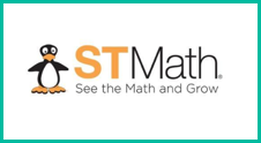to deepen learning through whole-class discussion

The new ST Math Chats bring ST Math puzzles into the classroom, deepening students’ understanding of abstract math concepts through whole-class discussion.
ST Math Chats are 25- to 30-minute lessons that utilize 1:1 or 2:1 technology to create an interactive learning and sharing experience that begins with visual models or puzzles. Using MIND’s “play, discuss, apply” model, these lessons designate time for students to play an ST Math game, participate in whole-class discussion, and then apply what they’ve learned to a math problem that concludes the lesson.
“In my classroom, we have a lot of students who are learning the English language, so they maybe haven’t been as active in my math class previously,” said Meagan Erwin, a 3rd-grade teacher at Columbus City Schools. “But all they have to do is look at those puzzles and everyone’s engaged in what we’re doing. Having that targeted puzzle work where we’re all doing the same puzzles at the same time, and then can come back and talk about that, has been great for the kids and for my math instruction.”
ST Math Chats will be available for the 2019-2020 school year in open beta for no additional charge to current customers as well as those signing on during the year. The lessons are standards-aligned for grades three through five, and designed for easy implementation. Each lesson provides opportunities for whole-class, small-group, and partner discussion. Guided questions offer suggestions on how to spark conversation every step of the way.
“When students are truly engaged in learning, they want to talk about it,” said Brett Woudenberg, MIND’s CEO. “Discussion is an organic part of the learning process, and ST Math Chats have really been designed to inspire rich math discussions that reinforce and deepen conceptual understanding. And we’ve also designed Math Chats with teachers in mind, making it easy to take the ST Math approach from a 1:1 or 1:2 environment into a group lesson that is ready to go and doesn’t require any additional planning. Teachers who are already using Math Chats have told us that it’s a powerful tool for their math instruction.”
During ISTE, MIND Research Institute will be holding 45-minute sessions in which attendees will experience the “play, discuss, apply” model that drives ST Math Chats. Sessions are scheduled for Monday, June 24th, and Tuesday, June 25th at 2 p.m. in the Cisco Active Learning Space, located in room 106AB. Interested educators can register online for the Monday session or the Tuesday session.
MIND Research Institute will also be showcasing ST Math Chats at the PR with Panache! Storytelling Suite, which will take place in the Hard Rock Café from 1 PM to 5 PM on Monday, June 24th, and 8 AM to 5 PM on Tuesday, June 25th. To schedule a one-on-one conversation, please contact Chris Piehler.
About MIND Research Institute
MIND Research Institute is a neuroscience and education social impact organization dedicated to ensuring that all students are mathematically equipped to solve the world’s most challenging problems. MIND is the creator of ST Math®, a PreK-8 visual instructional program that builds a deep conceptual understanding of math through rigorous learning and creative problem-solving. MIND has also developed programs under MathMINDs to provide students, teachers, and families dynamic ways to actively engage with math, and to close the experience gap for all learners. MathMINDs includes Family Game Nights, the national K-12 Game-a-thon, and MathMINDs Games.
ST Math is a visual instructional program created by MIND that builds deep conceptual understanding of math through a patented approach that engages, motivates, and challenges PreK-8 students toward higher achievement. Longitudinal and broad-based studies across diverse population groups continue to demonstrate ST Math’s efficacy in building lifelong learners prepared for success in STEM fields. ST Math currently reaches more than 1.2 million students and 56,000 teachers at 4,300 schools in 47 states. For more information, visit MINDResearch.org and stmath.com.












